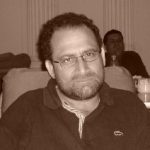Haidar Eid is an acclaimed critic and Associate Professor of Postcolonial and Postmodern Literature at Gaza’s al-Aqsa University in Palestine. He has published widely on Cultural Studies and literature. He has also written widely on the Arab-Israeli conflict. Eid received an MA in English Studies (postcolonial literature) from Eastern Mediterranean University in Northern Cyprus. After teaching in Northern Cyprus, he went on to earn his Ph.D in English Literature and Philosophy from University of Johannesburg. With Ph.D. in hand, he took a series of positions, as Senior lecturer at Vista University — Soweto; assistant professor at Al-Quds Open university in Gaza/Palestine; visiting professor in the department of foreign languages of The North China University of Science and Technology , co-ordinator of the Language Institute, Abu Dhabi University , Abu Dhabi, UAE and assistant professor at Mazoon College in Oman. He joined Al-Aqsa University in Gaza in 2005. He is also a policy adviser with Al-Shabaka, the Palestinian policy Network, and a member of the Palestinian Campaign for the Academic and Cultural Boycott of Israel. ‘WORLDING’ POSTMODERNISM: INTERPRETIVE POSSIBILITIES OF CRITICAL THEORY ‘Critically nuanced and theoretically grounded, Eid’s marshaling of major intellectual figures and their seminal contributions to the narrative of contemporary thought exemplified in the novel is indeed itself an essay in the provocative renewal of the poltico-cultural imperatives of historical materialism.’ Barbara Harlow, University of Texas at Austin, Author of Resistance Literature This engaging study by Haidar Eid argues for a reconstruction of a critical theory that retains an anti-authoritarian totality against the logic of ‘post-al’ theories. It attempts to reconstruct a notion of totality that has systematic and comprehensive aims. Moreover, the critical theory it calls for is informed by theories of rationality, reason, and knowledge without falling into essentialism and apriori epistemology. It therefore maintains that the ideological irresponsibility of some ‘post-al’ theories in ignoring broad social and political phenomena is necessarily a reflection of the penetration of global capital in almost all fields of life and the disintegration of the liberal public sphere. However, what this research ultimately aims to achieve is a dialectical critical theory that combines (post)modern and ‘traditional’ micro-and macro analysis. In its dialectical movement from theory to practice, through a historical materialist approach, the study explores the modernity and (post)modernity of James Joyce’s novel A PORTRAIT OF THE ARTIST AS A YOUNG MAN and Don DeLillo’s WHITE NOISE in relation to the political economy of the world(s) that has produced them. It investigates how the two texts — being modern and (post)modern — demonstrate, through their reflection of (on) capitalism as a macrophenomenon, a utopian vision of alternative world(s). This is achieved through a socio-historical consciousness that amounts to a criticism of the organizations and the Ideological State Apparati of monopoly and late capitalist societies.
Haidar Eid
PalestineUpcoming Events

A writer, a vision, a journey: a conversation with Professor Ilan Pappe
March 15, 2025
This event took place on 15 March, 2025 . You may...

مسافر يبحث عن ماء
February 17, 2025
تقيم نقابة اتحاد كتاب مصرشعبة أدب الرحلات تحت رعاي...

Online discussion of The Vegetarian by Han Kang Nobel Prize winner 2024
November 08, 2024
This discussion of Han Kang’s The Vegetarian...
Art Auction: Support Palestinian Families in Gaza
October 18 - 20, 2024
Join us on October 18th for Art for Aid, an online...
